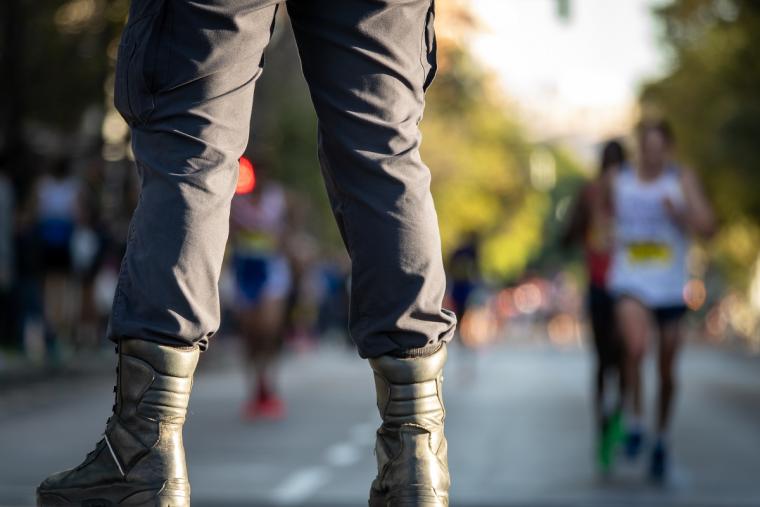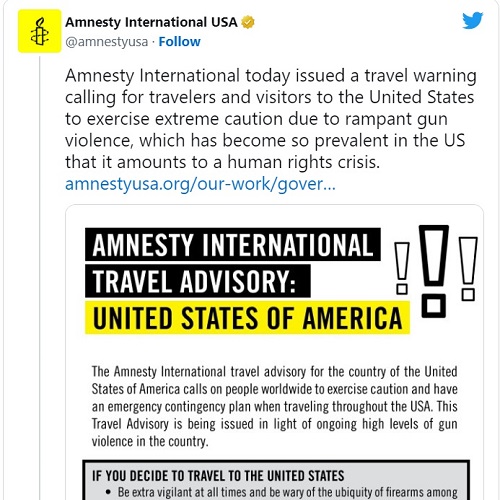
Countries outside the USA are warning their travelers about gun violence here. And that’s bad news for sports events that want to attract international tourism.
According to Newsweek, travel warnings are being issued by multiple countries. The warnings come in the wake of multiple mass shootings in areas like schools, supermarkets, nightclubs, malls and places of worship. The 2022 insurrection in Washington, DC, reported around the world, was another blow to the USA’s image.
So perhaps the warning is not too surprising, although it is disheartening, since American travelers tend to view as dangerous only those regions of the world where there is active war or political unrest. But here is what countries are saying, as reported by Newsweek and the Los Angeles Times:
Canada: In its advice to travelers heading across the American border, Canadian authorities write about the high rate of firearm possession in the U.S., saying that it is “legal in many states for citizens to openly carry firearms in public. Incidences of mass shootings occur, resulting most often in casualties. Although tourists are rarely involved, there is a risk of being in the wrong place at the wrong time.” The surge in deadly shootings across the U.S. has led the Canadian government to alert tourists to “familiarize themselves with how to respond to an active shooter situation.”
Australia: Travel advice suggests tourists exercise standard safety precautions when visiting the U.S., which is classified at a level 1 of danger. While Australia warns tourists against a number of perceived dangers in the U.S. (including extreme weather events, thieves and the threat of terrorist attacks) it writes that “violent crime is more common than in Australia. Gun crime is also prevalent. If you go to the U.S., learn and practice active shooter drills.”

U.K.: The U.K. reassures tourists that violent crime in the U.S., including gun crime, “rarely involves tourists” but advises travelers to “take care when traveling in unfamiliar areas.” Authorities add that “incidents of mass shooting can occur, but account for a very small percentage of homicide deaths.” The government asks British tourists to “avoid walking through less traveled areas alone, especially at night.” The British government also warns tourists traveling to the U.S. about the risks posed by terrorism and protests that could turn violent.
New Zealand: New Zealand has told its people that the U.S. has “domestic-based extremists.”
Germany: The German government tells travelers “it is easy to obtain guns” in the U.S., which has led to “occasional killing sprees.”
Venezuela: Crime-ridden Venezuela (whose relationship with the USA is not good) has recommended its citizens avoid travel to the U.S. completely because of the “proliferation of acts of violence and indiscriminate hate crimes.”
And while it’s admittedly not as bad as landing on the “do not travel list” for travelers coming from all directions (TSA’s worldwide list of countries and the status of precautions for outbound travelers from the USA can be found here), it’s bad news for a country gearing up to host events with an international following, including these:
- International Cricket Council (ICC) 2024 ICC Men’s T20 World Cup
- 2026 FIFA World Cup
- 2028 Summer Olympic Games
- Marathons with international athletes
- … and multiple others
And it’s not xenophobia; statistics show Canada, Australia and the U.K., for example, have considerably lower averages of gun violence-related deaths, as well as incidents. According to government data compiled by the BBC, only 4 percent of all homicides in the U.K. are gun-related killings compared to 13 percent in Australia and 37 percent in Canada (compared with 79 percent in the USA).
“Of the seven states with the most mass shootings this year (more than 800 combined), six will be World Cup markets in 2026,” notes the LA Times. “Contrast that with New Zealand/Australia, co-hosts of this summer’s Women’s World Cup, which has seen 14 mass shootings combined since 1990.”
But it’s not just other countries who think America is a risk. One major newspaper has gone on record as saying the USA should issue a voluntary warning.
USA TODAY notes, “If we’re going to point the finger at other countries, it’s about time we’re honest about ourselves. Before almost every international sporting event, Americans are warned about the dangers that might befall them while they’re there: War at the 2018 Olympics in PyeongChang. Widespread violence at both the 2014 World Cup in Brazil and the Rio Olympics two years later. Harassment of LGBTQ fans at last year’s World Cup. Terrorist attacks at the Olympics in both 2014 and 2004.”
The Los Angeles Times adds: “Even Amnesty International, the human rights watchdog best known for standing up to despots and criminal regimes, has issued warnings about the dangers of traveling to the U.S. That’s not exactly the kind of environment that’s likely to prove welcoming for soccer fans — or anyone else.”
“It’s fair to say that is one of the threats to the tourism industry that we can’t market our way out of,” Stephen Ekstrom, chief strategist of the Florida-based Tourism Academy, said of gun violence. The potential for the loss of international dollars due to travelers staying home out of fear, he added, is an enormous concern – particularly when stretched across a larger World Cup, for example (104 games total).
“Destination marketing organizations, many of them are entrenched with local politics. So they can’t have that conversation about [gun control and] politics. But it’s economics. We can talk about lost business, about lost business potential. If the U.S. is losing market share because of this issue, that’s a big deal. Absolutely it has an effect on the economics of travel and tourism.”
The extent to which fear will affect long-term international travel to the USA, however, is not only something that remains to be seen but something on which opinions differ. For instance, Alan Rothenberg, who organized the 1994 World Cup in the U.S., the best-attended and most successful in history, told L.A. Times reporters that he believes gun violence will have only a marginal effect on the 2026 tournament.
“While gun violence is horrible and the lack of action by Congress to enact meaningful gun control is inexcusable, it will have minimal impact, if any, on international travel to the United States for the 2026 World Cup,” said Rothenberg, chairman of the sports marketing agency Playfly Premier Partnerships and an advisor to several 2026 host cities. “In 1994, it was feared that gang violence in Los Angeles was going to limit World Cup attendance. It did not.”
In Rothenberg’s view, the lengthy delays in issuing visas to foreign travelers might be just as big a threat to successful sports tourism.
According to Skift, those who want to travel to the USA from India, for example, must wait 700 days for an interview at the Mumbai embassy, according to the U.S. State Department’s website, down from 999 days in January but still very high. It reinforces a 2023 Skift megatrend that large numbers of travelers from non-Western countries will be locked out of U.S. conferences and destinations because of border bottlenecks.
Other countries may experience shorter delays; the global median wait time for a B-1 or B-2 visa, also known as a visitor visa, has been reduced from 17 weeks in June to five weeks now. The U.S. Travel Association, a lobbying organization, estimates visa delays will cost the industry nearly $7 billion in traveler spending in 2023.

